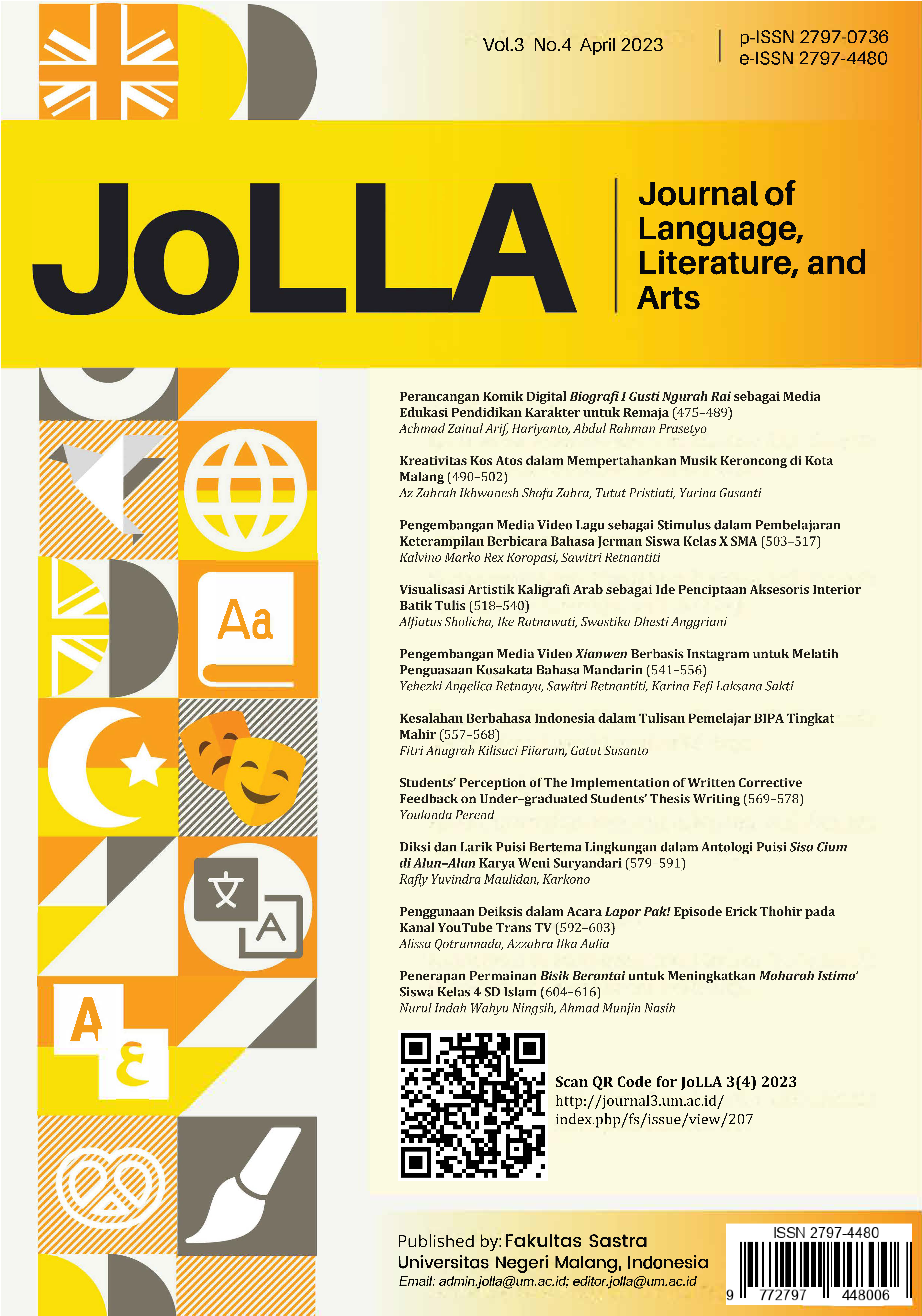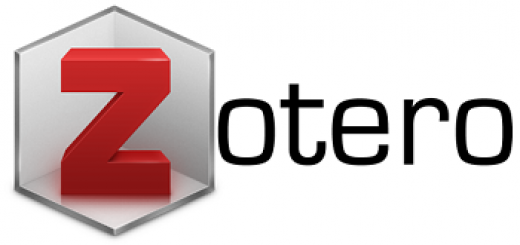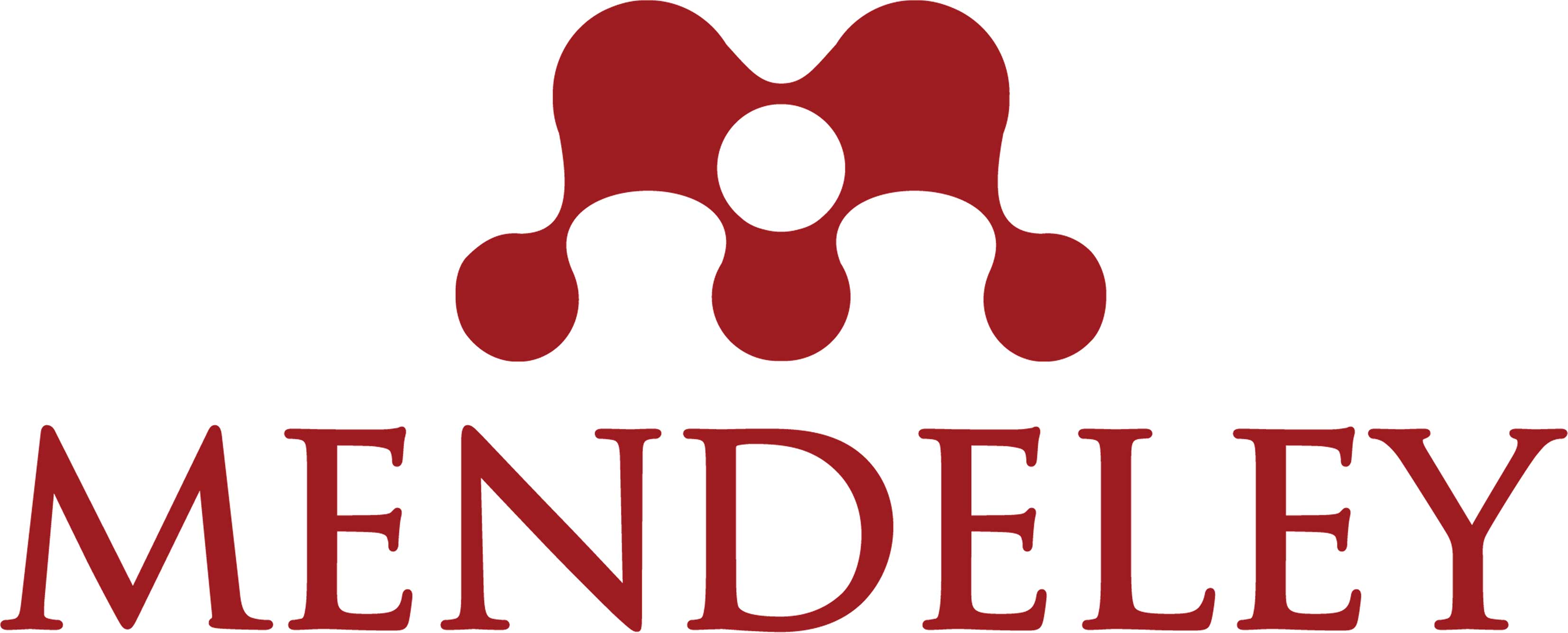Students’ Perception of The Implementation of Written Corrective Feedback on Under-graduated Students’ Thesis Writing
DOI:
https://doi.org/10.17977/um064v3i42023p569-578Keywords:
WCF, direct WCF, indirect WCF, students’ writingAbstract
Writing is considered as the most essential skill to exceed in many professional fields of study. How-ever, it is seen as the most challenging and complex skill to be engaged in because students must be encouraged to express their ideas and thoughts in the form of meaningful writing. To solve that problem, Written Corrective Feedback (WCF) came as a valuable strategy to help students in their progress of writing, especially in their revision. This study aimed to report on Indonesian under-graduated university students’ views about the given written corrective feedback on their thesis revision process. Furthermore, their preferences for different types of WCF are also investigated. This survey study collected data by distributing a questionnaire to fourty participants from English Department Students in Malang City that will be described quantitatively. Then, the interviews with six students were conducted to get the qualitative data to provide more in-depth information. The study showed that WCF plays an important role in students' thesis writing, as the students expected as long as the supervisors provided in a eligible and clear way. Based on the provided WCF, students could study from their errors, make corrections, and make improvements to their draft.
Kata kunci: WCF; direct WCF; indirect WCF; students’ writing.
Persepsi Mahasiswa Terkait Implementasi Korektif Tertulis pada Penulisan Skripsi Mahasiswa
Menulis dianggap sebagai salah satu keterampilan penting yang sering digunakan dalam bidang studi profesional. Namun, menulis kerap dipandang sebagai keterampilan yang paling menantang dan kompleks untuk dilakukan karena siswa harus didorong untuk mengungkapkan ide dan pemikiran mereka ke dalam bentuk tulisan yang bermakna. Untuk mengatasi masalah tersebut, Written Correc-tive Feedback (WCF) hadir sebagai strategi yang berharga untuk membantu siswa dalam kemajuan menulis mereka, terutama pada revisi mereka. Penelitian ini bertujuan untuk melaporkan tentang pandangan mahasiswa sarjana Indonesia tentang umpan balik perbaikan tertulis yang diberikan pada proses revisi tesis mereka. Selanjutnya, preferensi mereka untuk berbagai jenis WCF juga di-selidiki. Studi survei ini mengumpulkan data dengan menyebarkan kuesioner kepada empat puluh peserta dari Mahasiswa Jurusan Bahasa Inggris di Kota Malang yang akan dideskripsikan secara kuantitatif. Kemudian dilakukan wawancara dengan enam siswa untuk mendapatkan data kualitatif guna memberikan informasi yang lebih mendalam. Studi ini menunjukkan bahwa WCF memainkan peran penting dalam penulisan draft tesis mahasiswa, seperti yang diharapkan mahasiswa dimana pembimbing dapat menyediakan feedback dengan cara yang jelas dan dapat dimengerti. Berdasar-kan hasil, WCF yang diberikan dengan jelas dapat membuat siswa mampu belajar dari kesalahannya dalam penulisan, kemudian melakukan koreksi, dan dapat melakukan perbaikan pada drafnya.
Kata kunci: umpan balik tertulis; umpan balik langsung; umpan balik tidak langsung
References
Bitchener, J., & Knoch, U. (2008). The Value of Written Corrective Feedback for Migrant and International Students. Language teaching research, 12(3), 409-431. https://doi.org/10.1177/1362168808089924
Bitchener, J. (2008). Evidence in Support of Written Corrective Feedback. Journal of second language writing, 17(2), 102-118. https://doi.org/10.1016/j.jslw.2007.11.004
Braun, V., & Clarke, V. (2006). Using Thematic Analysis in Psychology. Qualitative research in psychology, 3(2), 77-101.
Ellis, R. (2009). A Typology of Written Corrective Feedback Types. ELT journal, 63(2), 97-107. https://doi.org/10.1093/elt/ccn023
Hyland, K., & Hyland, F. (2006). Feedback on Second Language Students' Writing. Language teaching, 39(2), 83-101. https://doi.org/10.1017/S0261444806003399
Irwin, B. (2017). Written Corrective Feedback: Student Preferences and Teacher Feedback Practices. IAFOR Journal of Language Learning, 3(2), 35-58. https://eric.ed.gov/?id=EJ1167256
Lee, I. (2019). Teacher Written Corrective Feedback: Less is More. Language Teaching, 52(4), 524-536. https://doi.org/10.1017/S0261444819000247
Muliyah, P., Rekha, A., & Aminatun, D. (2020). Learning from Mistakes: Students’ Perception towards Teacher's Attitude in Writing Correction. Lexeme: Journal of Linguistics and Applied Linguistics, 2(1), 44-52. http://dx.doi.org/10.32493/ljlal.v2i1.6995
Poorebrahim, F. (2017). Indirect Written Corrective Feedback, Revision, and Learning. Indonesian Journal of Applied Linguistics, 6(2), 184-192. http://dx.doi.org/10.17509/ijal.v6i2.4843
Purnomo, W. W., Basthomi, Y., & Prayogo, J. A. (2021). EFL University Teachers' Perspectives in Written Corrective Feedback and Their Actual Applications. International Journal of Evaluation and Research in Education, 10(3), 1089-1099. http://doi.org/10.11591/ijere.v10i3.21641
Suci, D. N., Basthomi, Y., Mukminatien, N., Santihastuti, A., & Syamdianita, S. EFL Students’ Responses on Teacher’s Online Written Feedback: Interaction, Revision, and Perception. Indonesian Journal of Applied Linguistics, 11(2), 292-306. http//doi.org/10.17509/ijal.v11i2.28549
Tan, K. E., & Manochphinyo, A. (2017). Improving Grammatical Accuracy in Thai Learners' Writing: Comparing Direct and Indirect Written Corrective Feedback. Journal of Asia TEFL, 14(3), 430. http://dx.doi.org/10.18823/asiatefl.2017.14.3.4.430
Truscott, J. (2007). The Effect of Error Correction on Learners’ Ability To Write Accurately. Journal of Second Language Writing, 16(4), 255-272. https://doi.org/10.1016/j.jslw.2007.06.003
Zumbrunn, S., Marrs, S., & Mewborn, C. (2016). Toward a Better Understanding of Student Perceptions of Writing Feedback: A Mixed Methods Study. Reading and Writing, 29(2), 349-370. DOI 10.1007/s11145-015-9599-3
Vyatkina, N. (2011). Writing Instruction and Policies for Written Corrective Feedback in The Basic Language Sequence. L2 Journal, 3(1). https://doi.org/10.5070/L2319070
Downloads
Published
How to Cite
Issue
Section
License
Copyright (c) 2023 Youlanda Perend

This work is licensed under a Creative Commons Attribution-ShareAlike 4.0 International License.





























